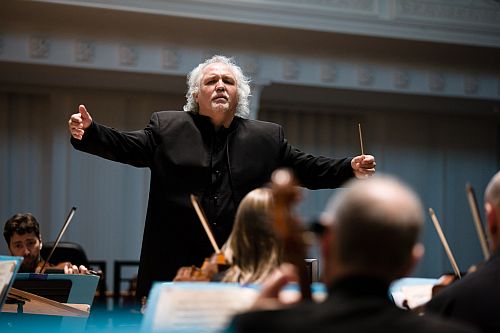 United Kingdom Rachmaninov, Wagner: Soloists, RSNO Chorus, BBC Scottish Symphony Orchestra / Donald Runnicles (conductor), Usher Hall, Edinburgh, 30.09.2012 (SRT)
United Kingdom Rachmaninov, Wagner: Soloists, RSNO Chorus, BBC Scottish Symphony Orchestra / Donald Runnicles (conductor), Usher Hall, Edinburgh, 30.09.2012 (SRT)
Rachmaninov: The Isle of the Dead
Wagner: Tristan und Isolde – Act 1
Nina Stemme – Isolde
Ian Storey – Tristan
Tanja Ariane Baumgartner – Brangäne
Boaz Daniel – Kurwenal
Nicky Spence – Young Seaman
Men of the RSNO Chorus

For reasons which, I’m sure, must make sense to someone, the BBC Scoittish Symphony Orchestra only does three concerts in Edinburgh per year outside of the Festival. This year they’re devoting those three concerts to one big enterprise: a complete performance, spread over eight months, of Tristan und Isolde. Runnicles has done this before, almost exactly ten years ago, and the previous project at the Barbican formed the basis of his recording of the opera.
Each concert features one act, paired with a work that has some relation to it. Tonight that companion piece was Rachmaninov’s Isle of the Dead, whose watery journey sounded especially compelling when placed next to that of Tristan’s first act. The brooding, restless strings moved with relentless intensity, crowned by a ringing brass chorale at the Dies Irae climax. From here it was only a short jump to the throbbing, anguished string tone at the Tristan prelude, surging with forceful passion and reaching a climax which seemed about to engulf the audience.
From the moment she opened her mouth, however, it was clear that the star of the evening was Nina Stemme. This Swedish soprano has made the part her own and she is every bit as dominant in the role today as were, say, Nilsson and Flagstad in theirs. That is not necessarily to invite comparison, but even if I were to, Stemme’s commanding, powerful performance could hold its own even in their company. I heard her sing the role complete at Covent Garden in 2009 and I remember thinking then that this was the kind of Wagner singing that we’re just not supposed to be able to get any more. Her assumption of the role has, if anything, grown since she recorded the role for EMI or at Glyndebourne, the voice having acquired a regal, superior air that was not so prevalent before. This makes her even more compelling to listen to and allows her to command the score and the stage in equal measure. Her narration pulsated with anguish and longing, culminating in a thrilling account of the curse, and the final, ecstatic duet after the potion was electric in its intensity. She is in complete possession of this part from the inside out and she alone is enough of a reason to rush to the box office to get a ticket for part two.
Ian Storey produced beautiful tone and a good stage presence, but he lacked the ability to ride over the crest of the orchestra and he sounded pretty tired by the end, something rather alarming considering he was only singing Act One. Baumgartner’s Brangäne was bright, intelligent and beautiful – a good foil for Stemme, and Boaz Daniel’s Kurwenal was brash and vigorous but always beautifully musical, as was Nicky Spence’s sailor, clear and ringing even from off stage. The gentlemen of the RSNO Chorus had a tendency to bray in their brief appearances, but they added colour and excitement as the intrusion of the outside world gets ever closer.
Runnicles is famous for his skill in this repertoire, and he moulded the whole, enormous arc with an architect’s skill. The score always had a sense of purpose and never lost its way, be it in the vast sweep of the tutti sections or the moments of delicate poise which leaven the texture. This sort of repertoire is bread-and-butter for Runnicles, but not so for his orchestra, which makes their playing all the more impressive. The strings, in particular, sounded as German as that of any band, and the winds lent delicacy and spice to a Wagnerian texture that never felt gloopy or out of balance. Part Two is in November: snap up a ticket for this great enterprise while you can. For full details see here.
The same programme was performed in Glasgow last Thursday night and broadcast live on BBC Radio 3. You can hear it here until October 4th.
Simon Thompson